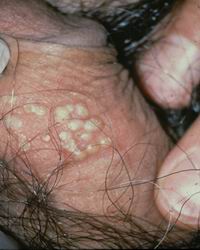Herpes simplex - wikipedia part 4
Source:
http://en.wikipedia.org/wiki/Herpes_simplex
Society and culture
Herpes simplex was not always stigmatised. It was merely a cold sore in an unusual place until the 1970s. As late as 1975, a study of “Psychological morbidity in a clinic for sexually-transmitted disease” (Richard Mayou, The London Hospital) [83] does not mention herpes simplex because at that time, there was no significant morbidity problem (i.e. mental anxiety or illness) associated with the virus.
In the Journal of Clinical Investigation,[84] Pedro Cuatrecasas states, “during the R&D of acyclovir (Zovirax), marketing [department of Burroughs Wellcome] insisted that there were ‘no markets’ for this compound. Most had hardly heard of genital herpes...” Thus marketing the medical condition – separating the ‘normal cold sore’ from the ‘stigmatized genital infection’ was to become the key to marketing the drug, a process now known as ‘disease mongering’ [85]
Since the creation of the herpes hype, some people experience negative feelings related to the condition following diagnosis, particularly if they have acquired the genital form of the disease. Feelings can include depression, fear of rejection, feelings of isolation, fear of being found out, self-destructive feelings, and fear of masturbation.[86] These feelings usually lessen over time. Much of the hysteria and stigma surrounding herpes stems from a media campaign beginning in the late 1970s and peaking in the early 1980s. There were multiple articles worded in fear-mongering and anxiety-provoking terminology, such as the now ubiquitous "attacks," "outbreaks," "victims," and "sufferers." At one point the term "herpetic" even entered the popular lexicon. The articles were published by Reader's Digest, U.S. News, and Time magazine, among others. A made-for-TV movie was named Intimate Agony. The peak was when Time magazine had 'Herpes: The New Scarlet Letter' on the cover in August 1982, forever stigmatizing the word in the public mind.[66] The scientific reality is that most people are asymptomatic, the virus causes no real health problems for a vast majority of people, and a vast majority (around 90%) of the Earth's population carries HSV-1, 2, or both.[87][88] Herpes support groups have been formed in the United States and the UK, providing information about herpes and running message forums and dating websites for "sufferers." People with the herpes virus are often hesitant to divulge to other people, including friends and family, that they are infected. This is especially true of new or potential sexual partners whom they consider casual
Research
Researchers at the University of Florida have made a hammerhead ribozyme that targets and cleaves the mRNA of essential genes in HSV-1. The hammerhead which targets the mRNA of the UL20 gene greatly reduced the level of HSV-1 ocular infection in rabbits and reduced the viral yield in vivo.[90] The gene-targeting approach uses a specially designed RNA enzyme to inhibit strains of the herpes simplex virus. The enzyme disables a gene responsible for producing a protein involved in the maturation and release of viral particles in an infected cell. The technique appears to be effective in experiments with mice and rabbits, but further research is required before it can be attempted in people who are infected with herpes.[91]
Another possibility to eradicate the HSV-1 variant is being pursued by a team at Duke University. By figuring out how to switch all copies of the virus in the host from latency to their active stage at the same time, rather than the way the virus copies normally stagger their activity stage, leaving some dormant somewhere at all times, it is thought that conventional anti-viral drugs can kill the entire virus population completely, since they can no longer hide in the nerve cells. One class of drugs called antagomir could serve this purpose. These are chemically engineered oligonucleotides or short segments of RNA, that can be made to mirror their target genetic material, namely herpes microRNAs. They could be engineered to attach and thus 'silence' the microRNA, thus rendering the virus incapable to keep latent in their host.[92] Professor Cullen believes a drug could be developed to block the microRNA whose job it is to suppress HSV-1 into latency.[93]
One vaccine that was under trial was Herpevac, a vaccine against HSV-2. The National Institutes of Health (NIH) in the United States conducted phase III trials of Herpevac.[94] In 2010, it was reported that, after 8 years of study in more than 8000 women in the United States and Canada, there was no sign of positive results against the sexually transmitted disease caused by HSV-2[95] (and this despite earlier favorable interim reports[94]).
A laboratory at Harvard Medical School has developed dl5-29 (now known as ACAM-529), a replication-defective mutant virus that has proved successful both in preventing HSV-2/HSV-1 infections, and in combating the virus in already infected hosts, in animal models. It has been shown that the replication-defective vaccine induces strong HSV-2-specific antibody and T-cell responses; protects against challenge with a wild-type HSV-2 virus; greatly reduces the severity of recurrent disease; provides cross-protection against HSV-1, and renders the virus unable to revert to a virulent state or to become latent.[96] His vaccine is now being researched and developed by Accambis (acquired by Sanofi Pasteur in September 2008), and is due to be applied as an Investigational New Drug in 2009.[97] However, the status of ACAM-529 became after the acquisition somewhat unclear. According to Jim Tartaglia, a company representative of Sanofi Pasteur, ACAM-529 is still under development and should be enter phase I clinical testing in 2012. [98]
A private company called BioVex began Phase I clinical trials for ImmunoVEX, another proposed vaccine, in March 2010.[99] A completely new approach has the "HSV-2 ICP0 live-attenuated HSV-2 vaccine" investigated by Dr. William Halford at the Southern Illinois University (SIU) School of Medicine.
